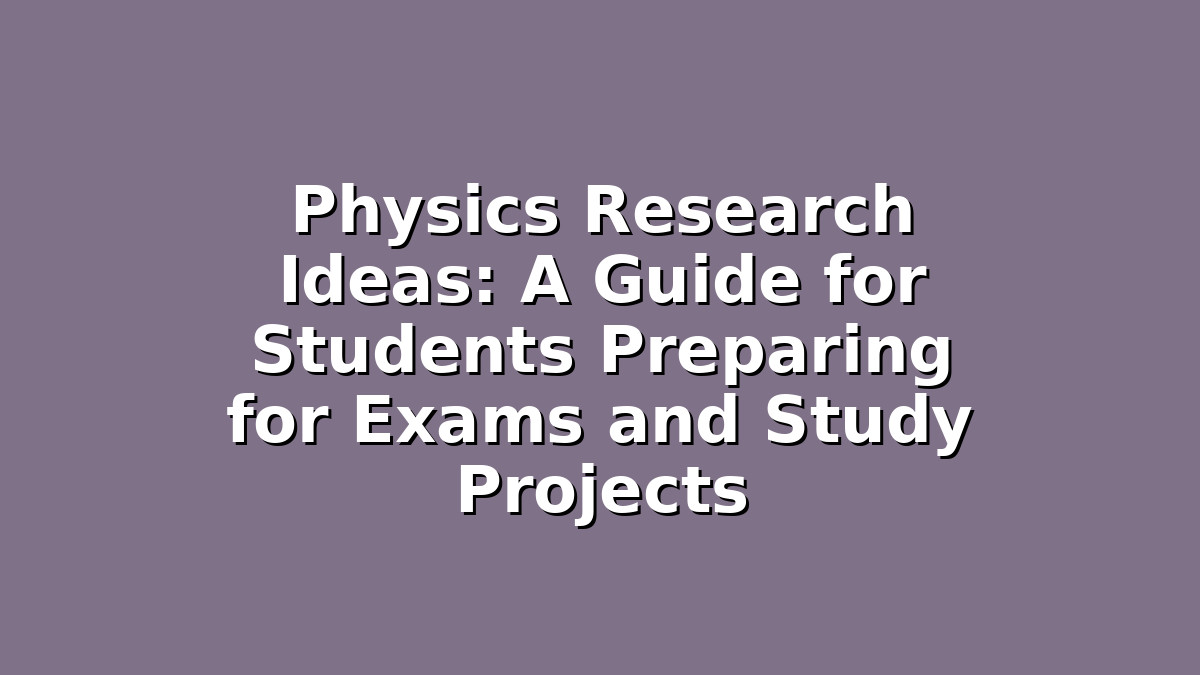Physics is a fascinating subject that helps us understand the fundamental laws governing the universe, from the tiniest particles to the vastness of space. For students preparing for exams or looking to deepen their understanding through research projects, selecting the right physics research ideas can be both exciting and challenging. Whether you are aiming to improve your exam performance or want to explore practical applications of physics concepts, this guide will provide you with valuable research ideas along with study tips to help you succeed.
In this article, we will explore three key areas: selecting suitable physics research topics that align with your study goals, effective methods to approach your research and study, and how to leverage your findings to enhance exam preparation.
1. Choosing Physics Research Ideas That Enhance Exam Preparation
When preparing for exams, it’s important to choose research ideas that not only interest you but also reinforce your understanding of core physics concepts. Here are some physics research ideas tailored to common exam topics:
a. Investigating Newton’s Laws Through Everyday Phenomena
Newton’s laws of motion are foundational in physics exams. Consider researching how these laws apply to everyday activities such as riding a bicycle, driving a car, or playing sports. Conduct simple experiments or collect observational data to see Newton’s laws in action. This hands-on approach will help you grasp the concepts more firmly, making it easier to recall them during exams.
b. Exploring Energy Conservation in Simple Systems
Energy conservation is another crucial topic. A project could involve studying the transformation of potential energy to kinetic energy using pendulums or roller coasters (even tabletop models). Documenting your observations and calculations will deepen your understanding of energy types, transfers, and losses, which are commonly tested in physics exams.
c. Researching Wave Properties in Sound or Light
Waves and optics are often included in physics syllabi. You might research how sound waves travel through different materials or investigate the refraction and reflection of light using prisms or lenses. Such projects make abstract concepts tangible, helping you visualize and remember key principles.
Study Tip: When selecting topics, focus on those directly related to your syllabus and exam pattern. Use your research as a form of active learning—taking notes, drawing diagrams, and solving related problems to reinforce the material.
2. Effective Research and Study Methods for Physics Projects
Conducting physics research projects requires a structured approach. Here are some study-related advice to help you gain the most from your research work:
a. Break Down Complex Concepts into Manageable Parts
Physics topics can be complex. Start by breaking down the topic into smaller, understandable segments. For example, if you’re studying electromagnetic waves, first focus on understanding electric fields, then magnetic fields, and finally how they interact to form waves. This step-by-step method prevents overwhelm and improves retention.
b. Combine Theoretical Study with Practical Experiments
Theory and practice go hand in hand in physics. Reading textbooks or watching educational videos should be paired with experiments or simulations. You can use low-cost materials for experiments or explore online simulators like PhET Interactive Simulations to visualize phenomena. This combination solidifies your understanding and prepares you for both theoretical and practical exam questions.
c. Keep a Detailed Research Journal
Documenting your research process is crucial. Maintain a journal where you write down your hypotheses, experiment setup, data collected, and conclusions. This practice helps improve critical thinking, enables easy revision, and can even assist in writing project reports or presentations.
d. Use Study Groups to Discuss and Clarify
Collaborate with peers who are also interested in physics. Explaining concepts to others and hearing different perspectives can clarify doubts and deepen understanding. Study groups can also help keep you motivated and accountable.
3. Applying Research Findings to Improve Exam Performance
Once you have completed your research, the next step is to use your newfound knowledge to enhance your exam preparation.
a. Create Summary Notes and Concept Maps
Transform your research findings into concise summary notes or visual concept maps. These tools help organize information logically, making revision more efficient. Highlight key formulas, principles, and experiment results that are most relevant to your exams.
b. Practice Problem-Solving Based on Your Research Topics
Use past exam papers or sample questions related to your research area to practice problem-solving. For example, if your research was on projectile motion, solve numerical problems involving trajectories, velocities, and time of flight. This practice will build confidence and improve accuracy.
c. Teach Others What You’ve Learned
One of the best ways to cement your understanding is by teaching. Explain your research findings and physics concepts to classmates, family, or even through online platforms like blogs or videos. Teaching forces you to clarify your thoughts and identify any gaps in your knowledge.
d. Relate Research to Exam Format and Marking Schemes
Align your study with the exam pattern by practicing questions in the format you will face. If your exam includes multiple-choice questions, short answers, or long problem-solving questions, tailor your revision accordingly. Knowing the marking scheme helps prioritize which topics and types of questions to focus on.
Conclusion
Choosing the right physics research ideas and combining them with effective study strategies can significantly boost your exam readiness. Start with topics that relate to your syllabus and everyday experiences, blend theoretical learning with experiments, and keep detailed records of your progress. Use your research to create revision materials, practice exam-style questions, and teach others to reinforce your knowledge.
Remember, physics is not just about memorizing formulas—it’s about understanding how the universe works and applying that understanding practically. Stay curious, be persistent, and use your research as a stepping stone towards success in your exams and beyond.
Good luck with your studies, and keep exploring the exciting world of physics!

Responses